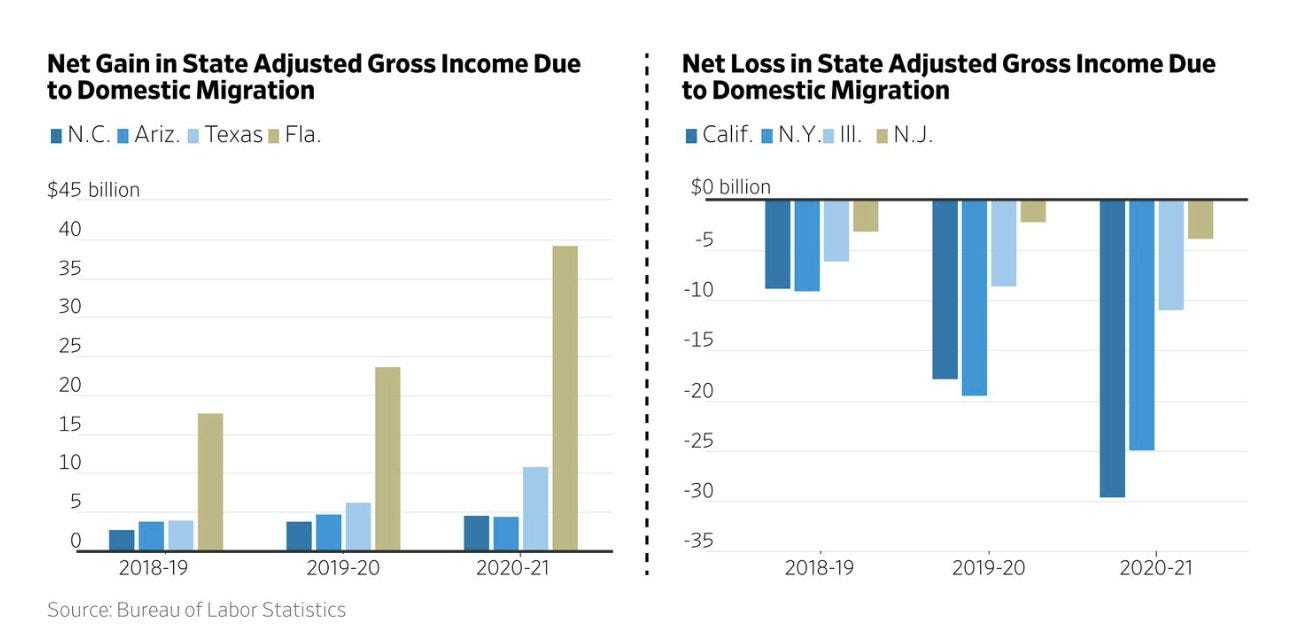White progressives in America, as in Britain, avoid diverse neighborhoods and are more likely to leave diverse places than white conservatives. In effect, they don’t practice what they preach. These are the findings from large-scale quantitative research in the United States and Britain, recently published in my academic article, “White flight from immigration?: Attitudes to diversity and white residential choice.”
Possibly related, here is a chart from Moses Sternstein:
Florida is gaining high-income earners, and California and New York are losing.
When I was two years old, economist Charles Tiebout published an article that is still referred to today. The Tiebout hypothesis was that households would move to locales in which the mix of public services and taxes suited their preferences. If you want a lot of local services and are willing to pay high taxes, you move one place. If you prefer low taxes and are willing to do without lots of public services, you move to another.
Tiebout competition also should promote efficiency. If you have high taxes and not such good public services, you will lose people. Inefficient governments won’t go out of business, exactly, but they will lose “customers” and perhaps find themselves under pressure to reform. New York and California are losing customers, but I don’t see them reforming any time soon.
The Tiebout hypothesis is highly relevant to the relationship between exit and voice. You might think that government policy on taxes and spending is determined by voice, as expressed through voting. Tiebout suggested that at a local level policy will be determined by exit, as carried out by people moving to different jurisdictions.
I have always doubted that Tiebout competition works very well. A lot of my skepticism comes from my own experience. Where I live, in Montgomery County, Maryland, I could hardly hate the government more. Democrats never lose. In primaries, candidates backed by the teachers’ union never lose. Extreme progressives are increasingly defeating moderates. The result is that we are a high tax jurisdiction, with mediocre schools (the WaPo regularly reports that we have great schools, but they seem to measure this by spending, not by outcomes) and bloated teacher pensions.
But we have friends here. And there are live Israeli dance sessions three nights a week.
We could move to Boston, where we have children and grandchildren, and there is plenty of dancing. But Boston winters are miserable, and the local governments are just as progressive and just as bad. In the wealthy suburb of Newton, the streets are nothing but potholes patched together. This is probably one of the 10 most lucrative tax bases in America, but if you drive there you might think you were in a Third World country.
I grew up in suburban St. Louis. In the 1950s, University City (where Washington University is located) turned down a department store that wanted to locate there. It located in nearby Clayton. The tax base of Clayton rose, and for some reason they did not fritter the money away. So Clayton attracted wealthier and wealthier residents, becoming a regional financial center, and then it did not matter if the government frittered money away. There was so much of it that some of it was bound to end up as nice public facilities.
Several years ago, I looked up the price of a home in the neighborhood where we lived in U. City. It was $39,000. A few miles away, in Clayton, where we moved when I was eleven years old, an equally modest home would have fetched at least half a million.
The chart above made me think of that. Florida is like Clayton. It is going to enjoy a virtuous cycle in which more wealth comes to the state, tax revenue rises, and the government just has to be halfway competent to keep the state attractive. Meanwhile, the deep Blue jurisdictions controlled by teachers’ unions will be like U. City. They will suffer from a vicious cycle of losing wealthy taxpayers, leading them to have to raise tax rates and cut public services.
When it comes to local government, Tiebout competition does not work very well. But it works way better than voting. In a jurisdiction that is proudly progressive, trying to vote against teachers’ unions is futile. Exit is your only option.
My anecdotal observation is that Kaufmann is correct. I have many friends who voice progressive values. But they choose to live in very white neighborhoods and to live very conservatively. Their foot voting contrasts with their voice voting.
This essay is part of a series on human interdependence.
Substacks referenced above:
@






Arnold don’t get me started on the people’s republic of MoCo. I’m holding on until my last kid graduates high school and then going to Colorado.
Seems to me that “voicing” one way and “exiting” another way is the definition of “luxury beliefs.”